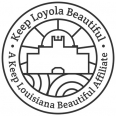
Thanks to the work of our Keep Louisiana Beautiful Affiliate team, led by Mark Tobler, Loyola has received over $4,800 to upgrade on campus recycling options.
This includes new signage and recycling stations around Monroe Hall, and a glass recycling hub at the north entrance to the West Road parking garage. The university will be partnering with Glass Half Full, a local company that processes glass into sand for disaster relief, coastal restoration and more. The stations will be on-site and functioning by Feb. 1.
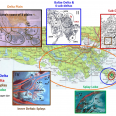
Dr. David White (emeritus) from the Department of Biological Sciences and the Program in the Environment at Loyola University New Orleans with expertise in “landscape plant ecology” of greater southeastern Louisiana has published the results of an important study of nearly 3 decades of research within the Mississippi River “Birdfoot'' Delta. The paper titled “Twenty-eight Years of Plant Community Development and Dynamics in the Balize Mississippi River Delta, Louisiana, USA '' can be found in the appropriately named international journal “Water”.
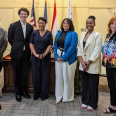
Spearheaded by the Center for Entrepreneurship and Community Development with faculty leadership from Dr. Hood, Director of the Environment Program, an amazing team of students studying Environmental Studies, Biomedical Engineering, Classical Latin, Business Management, Economics, Humanities and Architecture (Tulane) beat out teams from Harvard, Tulane and Sapienza University of Rome. The Loyola team, “People First” composed of four Loyola and one Tulane student won honorable mention.
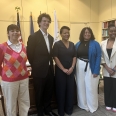
The Loyola team, “People First” composed of six Loyola and one Tulane student won honorable mention in the global “Students Reinventing Cities” competition. Mayor LaToya Cantrell will honor Sydney Lowman, Evan Roden, Mya Butler, Leila Avery, and Natalia Arredondo in a ceremony on September 25 and has asked them to make a 30-minute presentation of their proposal to revitalize East New Orleans.

Loyola is now among Keep Louisiana Beautiful’s University Affiliates. This program engages students in environmental stewardship and sustainability practices and is the largest and most successful program of its kind in the United States. The Environment Program's Mark Tobler is the university's KLB program manager.

Dr. Craig Hood, director of the Environment program, and Bara Watts, executive director of the Center for Entrepreneurship and Community Development, led a team of students participating in the global Reinventing Cities competition. The team earned honorable mention and will present their ideas to Mayor Cantrell later this year.

Robert Verchick, Gauthier-St. Martin Eminent Scholar and Chair in Environmental Law, shares his expertise with MSNBC viewers, addressing climate resiliency and the side effects of climate change.
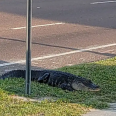
Dr. Bob Thomas shared his insights with The U.S. Sun to help inform a story of an alligator found “waiting” at a bus stop in Florida, noting that the more alligators have contact with humans, the more accustomed they become to being around us.
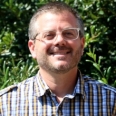
Joel MacClellan's article "Is Biocentrism Dead? Two Live Problems for Life-Centered Ethics", was recently published in the Journal of Value Inquiry. Biocentrism is the idea that environmental ethics should take a more wholistic approach, focusing on all living organisms rather than simply humanity.
Adrienne Ingram ENVB'18, currently a science faculty member at Haas Hall Academy, was
chosen for the NSF-funded Arkansas Data Analytics Teacher Alliance (AR-DATA) program that
provides mathematics, computer science, and pre-engineering teachers with transformative
research experiences thematically centered on data analytics, especially engineering
applications towards smart and connected health, infrastructure, and community. This summer
she developed a curriculum that uses computer programming courses as a conduit for teaching
